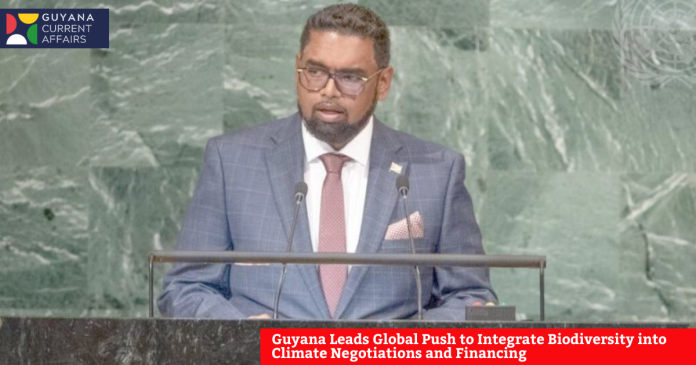Guyana’s Vision for Biodiversity and Climate Action
Guyana has emerged as a leading voice on the international stage, calling for the formal integration of biodiversity into global climate negotiations and financing mechanisms. President Dr. Irfaan Ali has emphasized that biodiversity must be treated as a central pillar in climate discussions, on par with forests and carbon markets, and not as a secondary concern.
Key Objectives
- Formal Integration at COP: Guyana is lobbying for biodiversity to be a key component in negotiations at the upcoming UN Climate Change Conference (COP) in Brazil, aiming to elevate its status in international climate policy.
- Market and Policy Mechanisms: The country advocates for the creation of robust policy and market frameworks that recognize and reward the protection of biodiversity, including the development of biodiversity credits and supportive financial structures.
- Global Biodiversity Alliance: Guyana is set to host the inaugural Global Biodiversity Alliance Summit in July 2025, bringing together world leaders, scientists, and innovators to craft a global framework for biodiversity protection and financing.
Guyana’s Model: Low Carbon Development Strategy (LCDS)
- Comprehensive Approach: Guyana’s LCDS 2030 is a national development blueprint that balances economic growth with environmental stewardship. It integrates biodiversity, marine economy, climate resilience, and sustainable financing into a unified strategy.
- Direct Benefits to Communities: Funds from carbon credits and biodiversity initiatives are channeled directly to indigenous and local communities, empowering them and supporting conservation efforts.
- Pioneering Biodiversity Credits: Building on its success with carbon credits, Guyana is developing a biodiversity credits system to monetize ecosystem services and attract sustainable investment.
International Recognition and Leadership
- Doubling Protected Areas: Guyana has committed to doubling its protected areas by December 2025 and achieving the global target of conserving 30% of land and sea by 2030.
- Hosting Global Summits: The upcoming Global Biodiversity Alliance Summit in Georgetown will focus on innovative financing tools such as debt-for-nature swaps and biodiversity bonds, aiming to mobilize significant resources for conservation.
- Influence on Global Policy: Guyana’s leadership has been credited with putting tropical forests and now biodiversity at the forefront of the COP agenda, inspiring other nations to follow suit.
Addressing the Financing Gap
President Ali has been vocal about the shortcomings of existing climate finance pledges, calling for credible, market-based solutions that move beyond unfulfilled promises. Guyana’s approach demonstrates how biodiversity can be valued as an economic asset, generating sustainable livelihoods while preserving ecosystems for future generations.
Conclusion
Guyana’s proactive stance and innovative policies are reshaping the global conversation on climate and biodiversity. By championing the integration of biodiversity into climate negotiations and financing, Guyana is setting a new standard for environmental leadership—one that balances prosperity with sustainability and positions biodiversity as a global asset essential to life, livelihoods, and planetary health.


